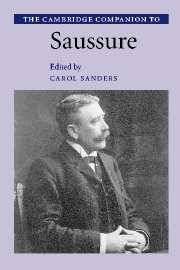Book contents
- Frontmatter
- Introduction: Saussure today
- Part I Out of the nineteenth century
- Part II The ‘Course in General Linguistics’
- Part III After the Cours
- 7 Saussure and American linguistics
- 8 Saussure and structuralist linguistics in Europe
- 9 The Russian critique of Saussure
- 10 Saussure, Barthes and structuralism
- 11 Saussure’s anagrams
- 12 Saussure and Derrida
- Part IV New debates and directions
- Notes
- Works by Saussure and further reading
- References
- Index
10 - Saussure, Barthes and structuralism
from Part III - After the Cours
Published online by Cambridge University Press: 28 May 2006
- Frontmatter
- Introduction: Saussure today
- Part I Out of the nineteenth century
- Part II The ‘Course in General Linguistics’
- Part III After the Cours
- 7 Saussure and American linguistics
- 8 Saussure and structuralist linguistics in Europe
- 9 The Russian critique of Saussure
- 10 Saussure, Barthes and structuralism
- 11 Saussure’s anagrams
- 12 Saussure and Derrida
- Part IV New debates and directions
- Notes
- Works by Saussure and further reading
- References
- Index
Summary
The emergence of semiology in post-war France coincided with renewed interest in the work of Ferdinand de Saussure and his 1916 Course in General Linguistics (henceforth Course). This interest extended beyond linguists, to include anthropologists, philosophers, literary critics and others associated with the rise of structuralism in France between the late 1940s and the mid 1960s. Received knowledge of Saussure as the founding father of modern linguistics drew largely on the Course that Charles Bally and Albert Sechehaye edited, following Saussure's death in 1913, on the basis of notes taken by students in courses he offered at the University of Geneva between 1907 and 1911. Questions concerning the accuracy of the Course as an account of Saussure's teaching extended debate within and outside France, even after critical editions appeared in 1967 and 1973. Yet such debate accounted only in part for the ongoing importance of the Course with reference to the origins, development and aftermath of Parisian structuralism that dominated French intellectual life during much of the latter half of the twentieth century. My aim in what follows is to trace and comment on the evolving role of Saussure's Course in the writings of Claude Lévi-Strauss, Roland Barthes and Jacques Lacan. In so doing, I mean to describe how and why references to the Course became standard in texts associated with the first wave of Parisian structuralism of the 1950s and 1960s (Dosse, 1997: 33).
- Type
- Chapter
- Information
- The Cambridge Companion to Saussure , pp. 157 - 173Publisher: Cambridge University PressPrint publication year: 2004
- 2
- Cited by



